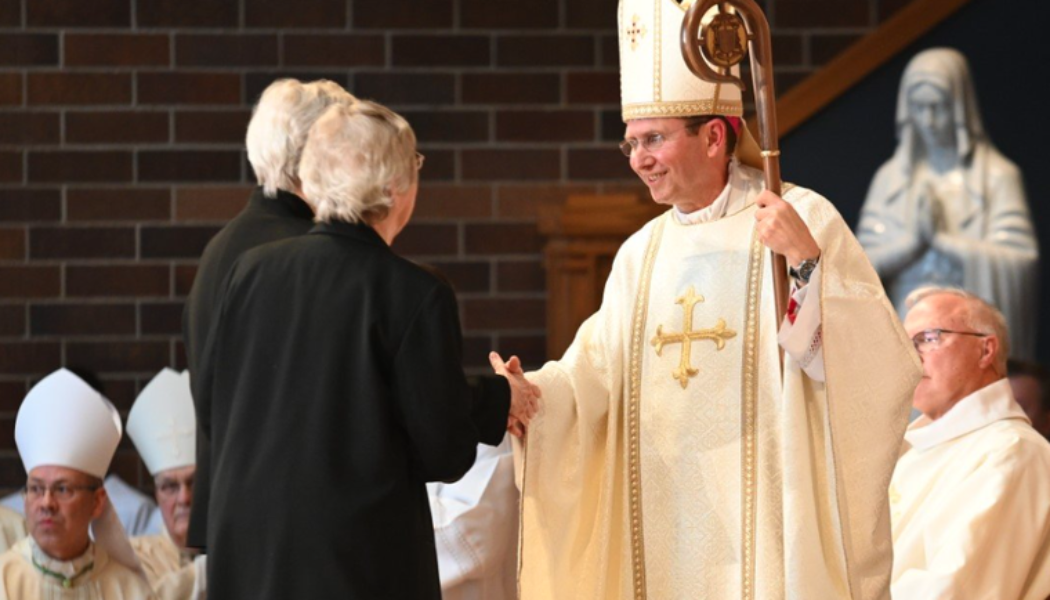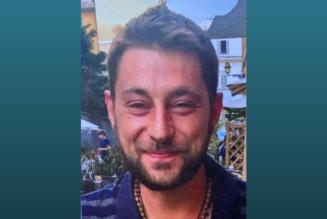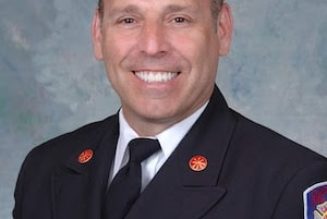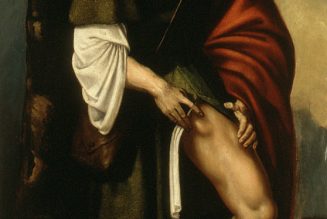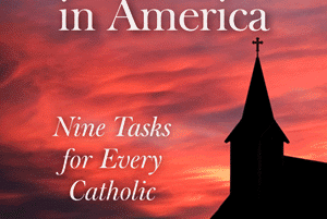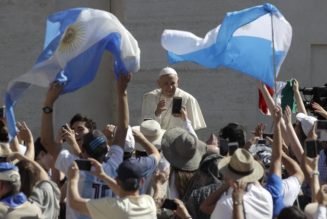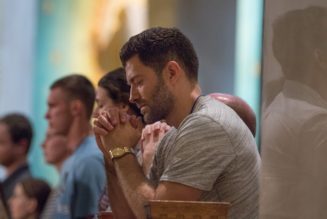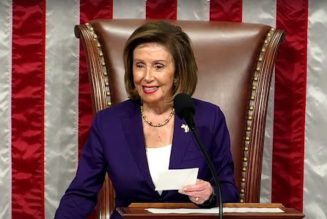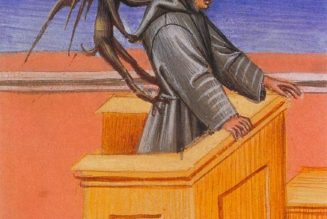
In many regards, it was entirely unremarkable: a short and simple memo, detailing some personnel decisions in a sparsely populated diocese far-removed from any significant source of worldly power.
But for the faithful in the beleaguered Diocese of Crookston, Minn., Bishop Andrew Cozzens’ letter of last week was nothing short of a pastoral revolution — and for Catholics more widely, it’s an instance of the kind of clarity the laity are increasingly expecting, though often lacking, from their leaders.
Issued on March 7, Bishop Cozzens’ letter was addressed to both the clergy and lay faithful of Crookston, a diocese that recently suffered through an acrimonious, multi-year investigation of its previous bishop, Michael Hoeppner, who only last April was forced to resign for grossly mishandling allegations of clergy sex abuse. Bishop Cozzens, who was installed to lead Crookston just 3 months ago, clarified in his letter that his predecessor would not be returning to the diocese for ministry, and that Bishop Hoeppner’s retirement compensation has also been reduced. Additionally, the young bishop made clear that a diocesan priest found to have “caused lasting harm to individuals and scandal in the diocese” for inappropriate activity is still prohibited from public ministry.
Bishop Cozzens’ decisions exhibit a refreshing concern for abuse victims and the families of his diocese. But more striking than the content of the decisions themselves was the tone with which they were made.
As Bishop Cozzens made clear in the opening paragraph of his letter, his decision to not only make these personnel moves but also to share his reasoning behind them was motivated by a desire to restore trust in diocesan leadership — a need he has heard repeatedly from priests and laity during diocesan listening and prayer events being held as part of the Church’s synod on synodality. Based off his own experience as a priest and then auxiliary bishop of the Archdiocese of St. Paul & Minneapolis, Bishop Cozzens said that this trust can only be restored by acting on “principles like listening to victim/survivors of abuse and putting their needs first, involving qualified laity to help make decisions, and being transparent about decisions and the reasons for them.”
His pastoral intentionality was not lost on Crookston’s faithful — nor on Church-watchers more broadly.
“Thank you for letting the families of the diocese know the honest truth about this matter,” commented one local woman on the diocese’s Facebook post of the letter.
“Very grateful for the update. It was needed,” wrote another.
And Stephen White, executive director of The Catholic Project, an initiative of The Catholic University of America that aims to increase collaboration between clergy and laity, described Bishop Cozzens’ letter with a one-worded tweet: “#transparency.”
At a time when Church leadership is still mired in a mode of self-protection that seems to privilege preserving the bureaucratic status quo over the concerns of the laity and the genuine health of the Church, a perspective only reinforced by presently unfolding cases in Brooklyn, Knoxville, and even the Vatican, Bishop Cozzens’ approach is a clear instance of the pastoral openness and concern that Pope Francis has repeatedly demanded from the Church’s shepherds.
Exactly for this reason, it was impossible to read about what Bishop Cozzens is doing in Crookston and the example he is setting for his brother bishops, and not be reminded that a recent portrayal of what “pastoral” looks like intentionally excluded him from consideration.
I’m referring to an article from five months ago by Michael Sean Winters. The piece was written primarily as an attack on Archbishop Charles Chaput, the retired leader of the Archdiocese of Philadelphia, but couldn’t help but include a swipe at Bishop Cozzens’ pastoral credibility. Archbishop Chaput, Winters claimed, was a culture warrior, not a pastor, and his style was incompatible with what Pope Francis looked for in a leader. In fact, Winters wrote, unlike “the rising stars of the hierarchy … bishops like Chaput get Crookston, not Chicago.”
The mention of Crookston was not done merely for the sake of alliteration. Bishop Cozzens, who was arrested for protesting outside abortion facilities as a young adult and has remained a steadfast defender of the Church’s vision of human dignity and sexuality as a cleric, had been named the next ordinary of the northwest Minnesota diocese only a week earlier. The message was clear: Bishop Cozzens is a culture warrior, not a pastor; and bishops like him get sent to the hinterlands, not the cushy seats of ecclesial prestige.
In light of the pastoral leadership Bishop Cozzens is displaying in Crookston, Winters’ article now gives us an opportunity to refine misguided understandings of what “pastoral” actually looks like.
First of all, the assertion that being a pastor is incompatible with a concern for social issues related to human sexuality and prenatal justice — which is what the smear “culture warrior” is meant to get at — is profoundly wrong and reductionistic. For starters, it imposes a rigid and false binary on the Church’s social teaching, which any good shepherd will promote in its entirety. Bishop Cozzens, for instance, has been one of the Minnesota bishops’ leading voices for immigration reform. But is this just an instance of him being a “culture warrior” at the expense of being a pastor? Of course not. Only a cramped and narrow vision, or one that denies the social dimension of the Church, could lead to that assessment, same as the perspective that public opposition to abortion access and same-sex marriage is necessarily “unpastoral.”
Even more deeply, the implication that concern for societal understanding and practices related to human sexuality is incompatible with being a good pastor presents a reductionistic view of pastorship, and ultimately the human person. A pastor is a shepherd, leading his flock to the fulness of life, which is found in and through relationship with Jesus Christ and His Church. Human sexuality is an integral dimension of who we are and how God invites us to participate in His life and mission — and while relationship with Jesus cannot be reduced to the Church’s moral teaching on sexuality, it certainly includes it.
To neglect this dimension, either at the personal level or the level of culture, is to neglect the human person. This approach reduces “being pastoral” to something soft and gooey, a motivational speaker without credibility and ultimately without genuine concern for the persons in one’s charge. Certainly a good pastor needs to have the prudence to know how to speak effectively to his people about human sexuality in a way that connects with their experience and appeals to where they’re coming from — but ignoring or distorting the Church’s teaching is, by definition, a failure to take a pastoral approach, not an instance of it. Instead of it being the case that someone concerned with issues related to human sexuality in the lives of his flock is inherently not a pastor, the opposite is true: a man who does not have this concern is not a good pastor.
It also needs to be emphasized that “being pastoral” is not something that can be assessed through the worldly logic of power and prestige. A pastor is one who is sent to care for a flock, not a bureaucrat who tries to climb a clerical ladder. While a worldly perspective might see an assignment to Crookston as a kind of “banishment,” a shepherd’s perspective — and quite possibly the one Pope Francis had when he made the assignment — views it as a mission of mercy to a hurting people on the periphery.
In fact, there’s good reason to think that Bishop Cozzens was sent to Crookston precisely because of his pastoral heart — something demonstrated by, among other things, the fact that he met monthly with Gina Barthel, a survivor of sex abuse in the Archdiocese of Saint Paul & Minneapolis, for seven and a half years. And when he found out he would be moving to Crookston? He called her to reassure her that he would not be abandoning her. “That’s the kind of shepherd he is,” Barthel shared on Twitter.
I am not suggesting that Bishop Cozzens is a “perfect pastor.” Christ alone is the Good Shepherd, and I’m sure that Crookston’s bishop would be the first to admit that he comes up short of that standard in any number of ways. But Bishop Cozzens’ pastoral leadership in Crookston, and the recognition this approach is rightly receiving, is a powerful corrective of misguided notions of what “being a pastor” looks like, notions that are all too often bound to rigid and unhelpful binaries, which are, ironically, themselves the product of “the culture war.”
Yes, Bishop Cozzens is a strong voice among the bishops for orthodox teaching on human sexuality and life. But he is also providing a compelling example of transparent, synodal leadership in the Diocese of Crookston. Yes, he is the USCCB’s head of Evangelization and Catechesis and is leading the National Eucharistic Revival, a favorite punching bag of progressive Catholic media, which begins this summer. But he is also a shepherd of sex abuse survivors, and has been invited to lead a Mass and Holy Hour for Healing and Reconciliation at CUA tonight.
Instead of viewing these different dimensions as at odds with each other, we might be better off asking how they point to a deeper integration of Catholic life, one which our media climate and partisan landscape so often tries to pry apart. And we might pray that more of our shepherds lead us as “both/and,” not “either/or,” pastors.
Join Our Telegram Group : Salvation & Prosperity
